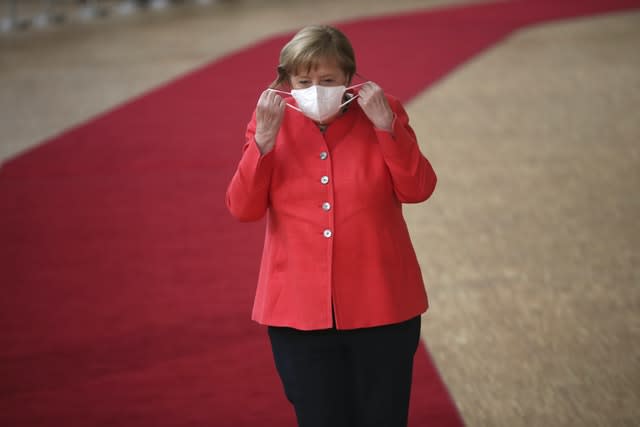EU leaders hold summit on recovery fund
EU leaders are meeting on Friday to discuss plans for an unprecedented 1.85 trillion euro (£1.6 trillion) EU budget and recovery fund.
All leaders were wearing masks as the summit got under way, with the usual hugs, handshakes and kisses replaced by friendly nods and elbow bumps.
The jovial atmosphere was not expected to last long at what will likely be one of the most brutal and bruising meetings of recent times, which could last longer than the scheduled two days, if necessary, to bridge the differences between leaders.

After addressing the leaders, European Parliament President David Sassoli said the stakes could not be higher and urged leaders to reach agreement as Europe is buffeted by the economic headwinds of the coronavirus crisis.
“Any postponement could trigger new storms and imperil the European scene,” he said.
“We know that forecasts are very negative. If Europe does not decide maybe a financial storm front could hit public finances and therefore it’s very important that there should be a decision, an agreement.”
French President Emmanuel Macron led the early negotiations, arriving in Brussels on Thursday and using the the pre-summit hours to meet Dutch Prime Minister Mark Rutte.
He is a stringent budget hardliner and considered one of the biggest obstacles to reaching a deal at the two-day meeting.
Mr Rutte said: “I am not optimistic but you never know. Nobody wants another meeting,”
Mr Macron underscored the importance of the challenge.
“The coming hours will be absolutely decisive,” he said.
“It is our project Europe that is at stake.”

German Chancellor Angela Merkel said on her arrival: “The differences are still very, very big and so I can’t predict whether we will achieve a result this time.
“So I expect very, very difficult negotiations.”
Latvian Prime Minister Arturs Karins said: “We want a result and we will continue working until we get that result.”
The bloc is suffering through the worst recession in its history and its 27 member states are fighting over who should pay the most to help other countries and which nations should get the most to turn around their battered economies.
“The crisis brought about by this pandemic, with all of its economic and social consequences, is the most severe we have had to face since the Second World War,” European Council president and summit host Charles Michel said.
The urgency is such that the leaders have ended a string of coronavirus-enforced video conference summits and are meeting in person for the first time since the pandemic began.
The usual summit venue, an intimate room high up in the urn-shaped Europa Centre, was deemed too snug to be safe and instead the leaders have been sent down to meeting room EBS-5, whose 850 square metres normally fits 330 people.
Delegations will be cut to a minimum, leaving leaders more dependent on their own knowledge of complicated dossiers.
It should put a smile on the face of Ms Merkel, who has been in office for 15 years and seen countless leaders come and go.
This #EUCO summit is about more than money. It’s about people, our European future, and our unity.
With political courage, I believe we can reach an agreement. pic.twitter.com/WN0yQYHU5C
— Charles Michel (@eucopresident) July 17, 2020
Since the pandemic struck, she has been seen as a safe pair of hands to lead her country through the crisis and now Germany holds the rotating six-month EU presidency her stature will be even greater at the summit.
The EU’s executive is proposing a 750 billion euro (£682 billion) recovery fund, partly based on common borrowing, to be sent as loans and grants to the most needy countries.
Mrs Merkel, who is in her last term and has her political legacy at stake, has already got Germany to agree to join in a common debt programme to alleviate the economic suffering in mostly southern and eastern member states.
She has also agreed to include grants and not just loans in the recovery package, to avoid overburdening member states with high debt already.
Mr Rutte does not like that and Dutch officials said they will stick to their tough line going into the summit, raising the spectre another one may be needed.
There are also plans to link budget funds to respect for basic democratic rights the European Parliament says are under threat in countries such as Hungary and Poland.
Hungarian prime minister Viktor Orban was clear he would fight any such strings attached to the plan.
“The Hungarian position is clear, Hungarians should decide about Hungarians’ money,” he said.

 Yahoo News
Yahoo News 
